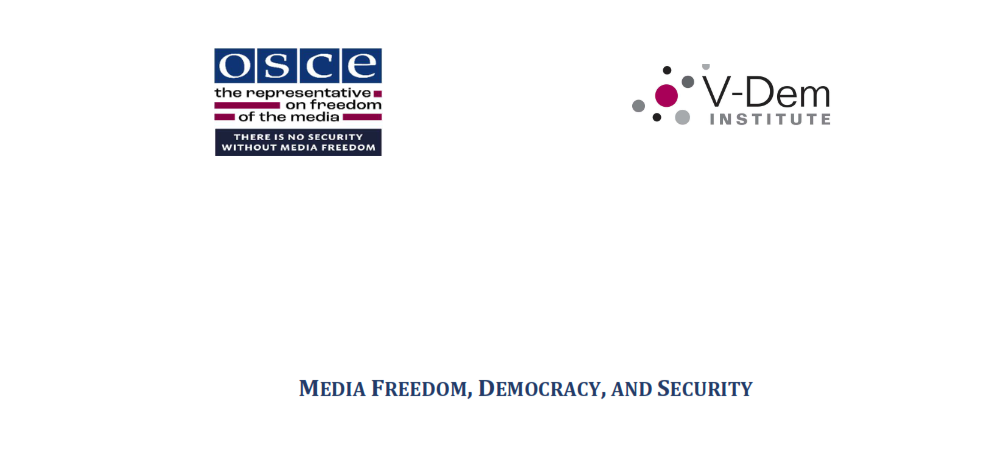A recent study commissioned by the OSCE Representative, on Freedom of the Media has revealed the connections between media freedom, democracy and global and local security. The detailed research document, crafted by a team from the Varieties of Democracy Institute at the University of Gothenburg presents evidence on why safeguarding media freedom is vital for upholding peace and stability within and among nations.
The report kicks off by shedding light on alarming trends of diminishing democracy and media freedom. Describing the state as a ‘third wave of autocratization’ it points out that global democracy levels have regressed to those observed in 1985. Notably it highlights that “as countries move towards autocracy media freedom is often the target for suppression.”
According to the report this decline in media freedom serves as a warning sign signaling threats to other democratic principles and freedoms. Which ultimately impact human security. The authors caution that attacks on media freedom are indicative of risks to rights and civil liberties.
The report further explores the interplay, between media freedom, democracy and security issues.
The report highlights research that demonstrates how democracies are less likely to be involved in armed conflicts. This phenomenon, known as the ” peace ” is attributed to values and structures such, as free media, which encourage peaceful conflict resolution. The presence of a media allows for the flow of information promotes government accountability and serves as a platform for public discourse and debate. Moreover it acts as a watchdog that exposes state actions identifies both victims and perpetrators of violence and enables criticism and activism.
The authors emphasize that media freedom plays a role in reducing the likelihood of interstate conflicts between democracies. Their statistical analysis supports findings by showing that an increase in media freedom corresponds with a decrease in the probability of militarized disputes between countries.
Furthermore the report delves into how democracy, media freedom and domestic armed conflictsre interconnected. It discusses studies illustrating how democratic institutions supported by media outlets help manage tensions peacefully by providing avenues, for expressing discontent through legal channels rather than resorting to violence.
The authors mention a point; countries that are, in a phase towards either democracy or autocracy tend to be more unstable, less established and therefore more susceptible to internal conflicts. The report highlights a trend regarding media freedom; moderate levels of media freedom are linked to risks of internal conflicts.
It is when countries surpass a level of media freedom and democracy that the security advantages become apparent. The authors note that as countries exceed this threshold enhancements in media freedom significantly reduce the likelihood of armed conflict.
Moreover the report delves into the relationship between media freedom, democracy and state repression. An aspect of security. Strong evidence indicates that democracies employ state repression and offer human rights protection compared to autocratic nations. According to the authors free media play a role in this scenario by exposing and scrutinizing state violence identifying victims and perpetrators well as enabling public condemnation and protests.
In conclusion the report states that while media freedom is essential it alone is not adequate for reducing state repression. Free, independent and diverse media outlets are deemed indispensable, for both promoting democracy and enhancing security.
In essence the OSCE report makes a case, for the importance of safeguarding media freedom as a priority for policymakers and members of civil society who are dedicated to strengthening both international and domestic security. According to the authors they emphasize that “democracy cannot exist without security and security cannot exist without media freedom.”
Notable Quotations from the Report;
“When nations move towards authoritarianism it is often media freedom that faces threats and erosion. Attacks on media freedom serve as a signal that other democratic rights and freedoms – along with security – are at risk.”
“Extensive research confirms that democratic nations generally do not engage in wars against one another. Democratic principles encourage conflict resolution while democratic institutions restrict leaders motives and abilities to resort to conflicts with free media playing a crucial role in this aspect.”
“Democracies characterized by high quality standards and greater levels of media freedom are less susceptible to conflicts. Democratic institutions help mitigate the likelihood of disputes within groups, by absorbing and directing dissent and grievances through avenues and established processes.”
In this journey autonomous media outlets hold a position fostering the exchange of ideas and the peaceful resolution of conflicts while also serving as a platform, for meaningful conversations among opposing parties.
“Media independence is an element in curbing oppression as it sheds light on and investigates such actions highlights both the affected and those responsible keeps society abreast of developments and allows for public condemnation and advocacy.”
“Although media freedom alone may not avert conflicts its presence remains essential, for upholding principles of democracy and ensuring security.”
DOWNLOAD THE REPORT : https://www.osce.org/representative-on-freedom-of-media/572878



